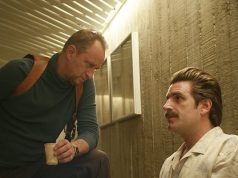“Man on the Moon” stumbles awkwardly in some minor areas, but still manages to convey in fascinating terms the oddness of Andy Kaufman’s life.
Little attempt is made to show us WHY Andy was so weird. In one telling scene, he says to his girlfriend Lynne (Courtney Love), “You don’t know the real me.” She replies, “There isn’t a real you.” He says, “Oh, yeah. I forgot.”
But even then, he hesitates slightly before saying it. It’s like he’s weighing what she said: IS there a real me? It seems like there WAS a real Andy Kaufman, somewhere underneath all the facades and characters and lunacy, but that it was easier for him to deny his existence than to get someone to understand him.
And that’s the attitude of Milos Forman’s film, too: Whatever Andy’s motivations were for all the publicity stunts and general strangeness, only he was aware of them.
Jim Carrey doesn’t so much portray Kaufman as he does channel him. The actor has never committed himself so deeply to a role. He’s even funnier as Kaufman’s alter ego, the odious lounge singer Tony Clifton (sort of how Mike Myers’ Dr. Evil stole the show from Austin Powers).
Forman does a fair job re-creating Kaufman’s public life, too. The actors who appeared with him on “Taxi” are made (as much as possible) to look 20 years younger than they do now; noticeably missing from those scenes, though, is Danny DeVito’s famous Louie DePalma character (DeVito is busy elsewhere in the film, playing Andy’s agent, George Shapiro — a bit of bad casting, in my opinion, since DeVito really should have been in those “Taxi” scenes).
However, other elements are sloppy. The famous showdown with wrestler Jerry Lawler on the David Letterman show is fine, except that neither Dave nor Paul Shaffer is made to look any different from the way they do now. Dave is even wearing his glasses, which he didn’t start doing on the air until a year ago; Paul, too, is completely clean-headed, which didn’t occur until recently.
These are minor things, but they’re troublesome: Why go to the trouble of re-creating the TV studio sets, the scenarios and the conversations — why go to the trouble of getting David Letterman, who rarely does this sort of thing — if you’re not going to do it right? Did Letterman and Shaffer just refuse to undergo wigs and makeup? Did Dave flat-out refuse to take off his glasses? It seems unlikely.
This sort of thing is worth mentioning because its symptomatic of the movie as a whole: It retells Andy’s public life but gives almost no insight whatsoever into his private life. Why make the movie if you’re not going to say anything?
As a documentary that is reasonably accurate, it’s highly entertaining. Kaufman was a wonderfully colorful character, and Carrey brings all that to life so well it engulfs the viewer. Just seeing all the crazy stuff he did re-enacted is entertainment enough — especially since we see some of the behind-the-scenes stuff, too. So much of what he did was an inside joke that only he and a couple others got; in this film, we’re made privy to some of it, too.
But just knowing which of Andy’s experiences were staged and which ones were real isn’t enough to tell us who he was. It’s interesting, sure, but as a biography, it’s about as insightful as a guy lip-synching the “Mighty Mouse” theme.
A- (1 hr., 59 min.; )





